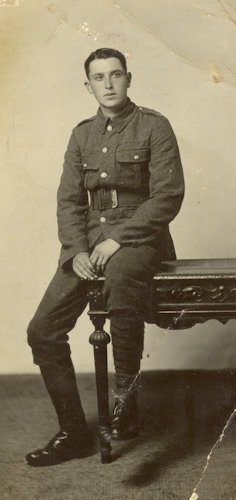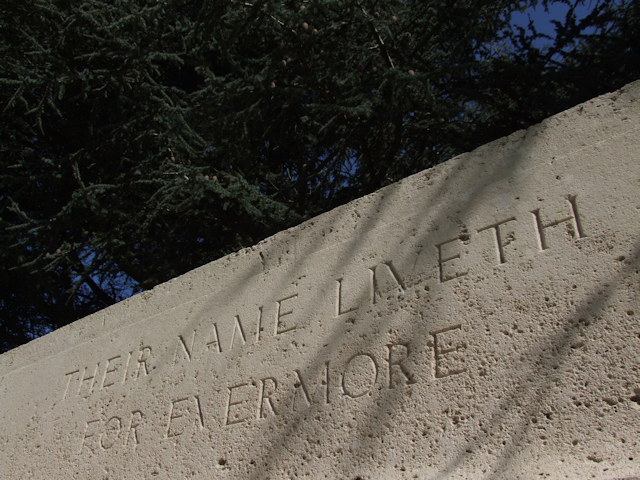Name
Albert Henry Henworth Poyser
Conflict
First World War
Date of Death / Age
Rank, Service Number & Service Details
Serjeant
Hertfordshire Regiment
Awards: Service Medals/Honour Awards
Cemetery/Memorial: Name/Reference/Country
Headstone Inscription
Not Researched
UK & Other Memorials
Pre War
He was born at Ashby-de-la-Zouch in the County of Leicestershire, England, on March 9th, 1892 and named Albert Henry Henworth Poyser. His parents were Middlemore Charles and my mother was Annie (called Nona) Poyser.
He lived at West Street, Hertford, which is where his sister Audrey Claudine was born, then later at an estate by the River Lea called the "Folly". From where he went to a school associated to the Congregational Chapel.
At the age of twelve (1904) he was employed as a houseboy with Mrs. Ginn of Queens Road, Hertford. The work was out of school hours and entailed cleaning shoes and cutlery, filling the coalscuttles, and doing any errands.
He left school in 1906 by which time the family were living in Bullocks Lane, Horns Mill and went to work at the local leather works of Webb and Company. A couple of years later he met Elizabeth Dedman originally from Braughing, who he later married (1915).
In 1911 he joined the Hertfordshire Territorial Army; this entailed training one evening a week. With the coming of war in August 1914 both regular and territorial armies were mobilised.
After mobilisation Albert had to leave work and report to the Headquarters, which was at the Drill Hall at the bottom of Port Hill, Hertford.
Wartime Service
The Regiment spent several days in organising for a war and being fully equipped, they were given 48-hours to 'leave to say farewell to relatives and friends. They were entrained for Romford, Essex and the a four-day march to Bury St. Edmunds in Suffolk where they undertook further training.
Having volunteered for overseas service, after training, they were given overseas leave of four days, and on the night of 5th November, 1914, we embarked at Southampton for Le Havre in France arriving there at dawn on the 6th.
From Le Havre, over the coming weeks they went to St. Omer, by open-top double-deck London bus to Poperinge, finally by foot to the battle front maybe six miles away on the outskirts of Ypres.
Albert notes that he “went through - Ypres, Neuve Chapelle, Festubert, Loos, Somme, Thiepval, and the River Ancre. By the end of the war on November 11th, 1918, the Hertfordshire Regiment had suffered losses in killed numbering 44 officers 850 other ranks.”
During leave he married Elizabeth Dedman at Braughing on the 20th December, 1915, he received a £20 gratuity and together they spent a most happy month after which he returned to the Battalion, which was by then on the Loos battlefront.
During 1916 and again in 1917, he had 10 days leave. Albert seems to have quite lucky in the sense that he went home on leave again and then from leave back into the line again, and so on until March 1918, when the Germans were preparing their Spring offensive.
Albert had a platoon of about 30 men with which to supply three outposts, consisting of a Lance Corporal and three men, between the nearest German lines and ourselves. It was his duty to visit them every two-hours throughout the night and at 4am. on the 6th March 1918 he was wounded by a shot in the arm near the shoulder. He was tended by first aid stretcher-bearers but could not leave the line until 8am because of the gunfire. He was to a dressing station, and then casualty station where he was operated on to extract the bullet. After that he went to a hospital until March 9th when he sailed for England and a hospital in Huddersfield before five-weeks in a convalescent camp in Blackpool.
He returned to duty and while in four-days leave, received orders proceed to Tipperary in Ireland where he stayed for 3-months before being sent to an Army base at Felixstowe and then to Norwich and the training of a young soldiers battalion, made up of ex-Borstal boys. Notably he was on duty for the unveiling of the memorial to Nurse Cavell, who, had been shot the Germans in Belgium.
He was still in Norwich until the war ended and was demobilised on 30th March, 1919.
Additional Information
Albert Poyser’s book, ‘Round the World in 80 Years’ can be found in the HAW Archive via Digital Publications or Hertfordshire Men & Women - Individuals Stories
Acknowledgments
Chris Wallis, Albert Poyser’s book ‘Round the World in 80 Years’, Jonty Wild



